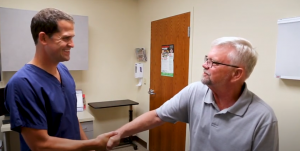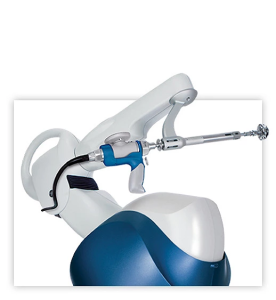Explore joint replacements at NMC Health
As we all work to maintain healthy, active lifestyles sometimes our bodies can’t quite keep up with us and we’re left with stiff joints or joint pain.
Joint replacement surgery can relieve that pain and help you move and feel better. The two most common types of joint replacements are hip replacements and knee replacements.
During surgery, an orthopedic surgeon replaces a damaged joint, such as a hip, knee or shoulder with a new one. Doctors typically use protheses made with medical grade metals, ceramics or plastics to form the new joint.
If you have a medical emergency, call 911 or visit the NMC Health Medical Center Emergency Department.
Mako SmartRobotics Robotic Arm-Assisted Surgery
NMC Health is the second hospital in the state to offer Stryker’s Make Robotic Arm-Assisted technology for joint replacements. This latest advancement in joint replacement surgery is transforming the way procedures are performed.
NMC board-certified orthopedic surgeon, Dr. J. Scott Pigg is specially trained in robotic arm-assisted surgery.
Each patient is unique and experiences different kinds of joint pain. Pain from arthritis and joint degeneration can be:
- Constant
- Come and go
- Occur with movement
- Occur after a period of rest
- Located in one spot
- Felt in many parts of the body
It is common for patients to try medication and other conservative methods like physical therapy to treat their knee, or hip pain. If you haven’t found adequate relief, you may be a candidate for a total knee, total hip or partial knee replacement.
FAQs
A hip replacement may be consider when arthritis limits everyday activities like walking or bending. If you have pain that doesn’t stop when you’re resting, it might be time to talk to your doctor.
If your knee is giving you fits and hurts even while walking, going up stairs or getting in and out of chairs, you might want to consider knee replacement surgery.
A joint replacement may be recommended only after an orthopedic surgeon takes a good look at your joints. You’ll want them to rule out any other problem first. Other treatment options include:
- Pain medicine or anti-inflammatories like Tylenol or Advil
- Injections
- Physical therapy
- Other types of surgery that are not as invasive
After a joint replacement, you’ll probably go home the day after surgery. This is true whether you get a hip replacement or a knee replacement.
Most joint replacement patients begin to stand and walk the day of surgery. A physical therapist will come to your room and start working on movements and exercises with you.
You’ll want to get up and moving as soon as possible to help limit the chance of blood clots in your legs. It also can lower your risk of pneumonia and constipation.
Recovery times will vary with each person. If you’ve gotten a hip replacement, your complete recovery may last three to six months after surgery. You’ll want to follow your surgeon’s instructions during the first few weeks after surgery to give yourself time to heal. You may need a walker or crutches for a short time to help with walking.
If you live alone, it might be a good idea to stay at a rehab center for a few days. Your transition will depend on how well you progress after surgery.
You should be able to resume normal, light activities within three to six weeks after surgery. Most people will gradually increase their activities, but you’ll need to hold off on high-intensity sports.
Joint Replacements Library

NMC Health Patient Calls Surgery “A Game Changer”

5 ways to ease joint pain


DocTalk: Robotic Arm-Assisted Joint Replacement


